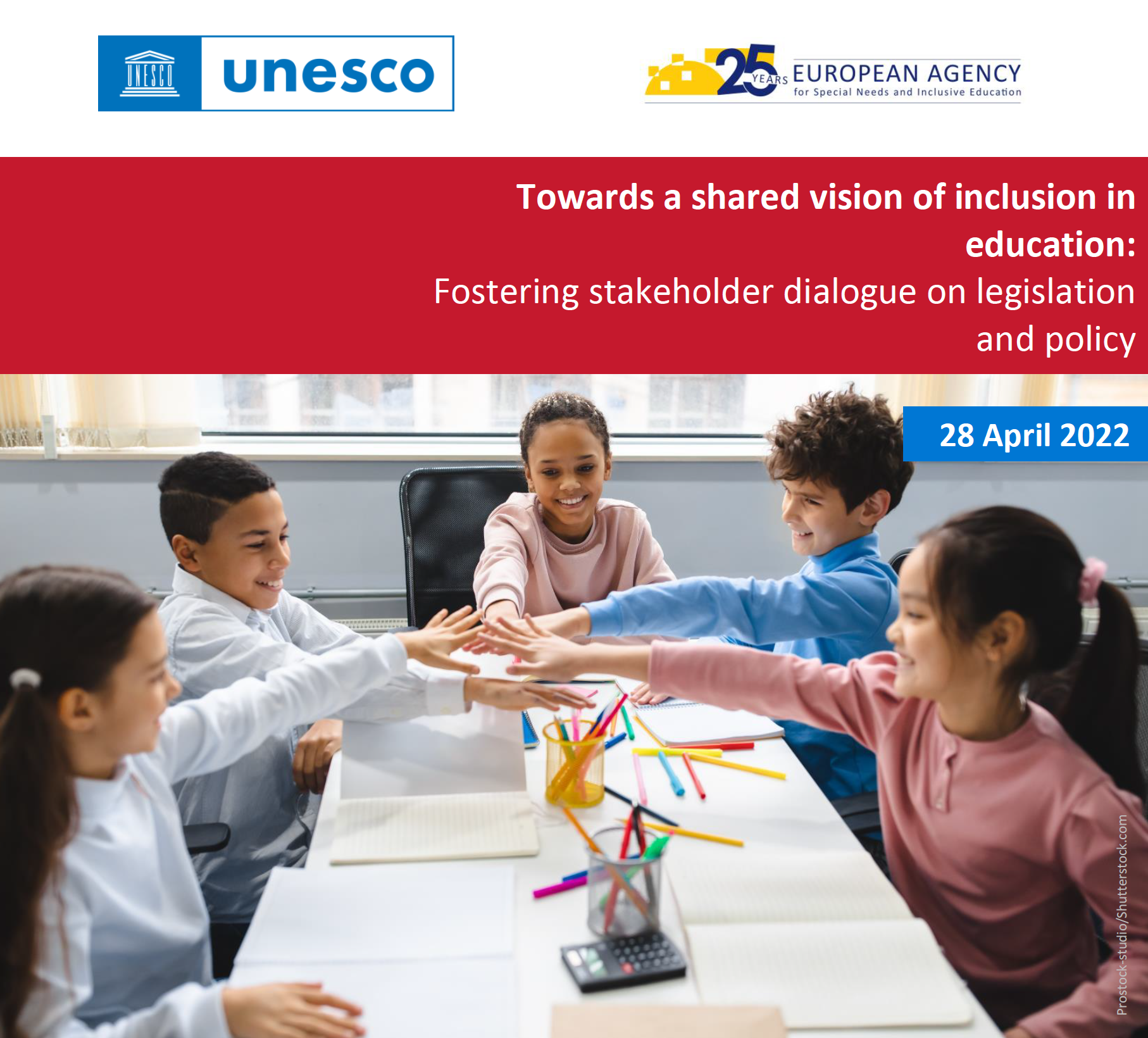The Agency and the United Nations Educational, Scientific and Cultural Organization (UNESCO) held a joint webinar on 28 April in which participants overwhelmingly affirmed the importance of including the voices of stakeholders in inclusive policy development and implementation. Almost 200 people from countries across the world attended the webinar, which was entitled ‘Towards a shared vision of inclusion in education: Fostering stakeholder dialogue on legislation and policy’.
Introductions came from Florence Migeon and Elspeth McOmish from UNESCO’s Section of Education for Inclusion and Gender Equality, and Agency Chair Don Mahon, who all stressed the importance of stakeholder dialogue in the two organisations’ work on inclusive education to date. Agency Director Cor J.W. Meijer outlined the Agency’s position that inclusive education is a human right and contributes to building more inclusive societies. He also reasserted the Agency’s commitment to including stakeholder voices in its future work, as reflected in the Multi-Annual Work Programme for 2021–2027. Anna Cristina d’Addio from UNESCO’s Global Education Monitoring (GEM) Report presented the key findings from the 2020 GEM Report on Inclusion and education and gave an overview of UNESCO’s Profiles Enhancing Education Reviews (PEER) website.
The topic for panel one was ‘The importance of stakeholder dialogue as an input to legislation and policy development’. Elżbieta Neroj, Deputy Director of the Upbringing and Inclusive Education department of the Polish Ministry of Education and Science, presented examples of stakeholder dialogue in recent work in Poland. The panel of education ministry representatives from Malta (Permanent Secretary Matthew Vella), Uruguay (Carolina Sanguinetti, Co-ordinator of the Inclusive Education Programme), Northern Ireland (Brenda Shearer, Head of the Special Education Team) and Jordan (Lama Al-Natour, Executive Director of the Development Co-ordination Unit) then discussed examples of stakeholder dialogue being used to develop inclusive legislation and policy in their countries. The panellists stressed that policy-makers must allow time and effort to collect and use stakeholder experience to inform their work, and that, although it is challenging, it is worthwhile to improve countries’ inclusive education systems. They also pointed out that monitoring of this process is essential, and that transparency is required to show stakeholders that their views are contributing to positive change.
Panel two focused on stakeholder dialogue ‘as an on-going input to policy implementation’. Bodil Hafsås and Linn-Hege Lyngby Eliassen from the Norwegian Ministry of Education and Research explained how stakeholder dialogue played a large part in the renewal of the Norwegian curriculum. Panellists Moazzam Shah Bukhari from the Walkway School in Pakistan, Simoni Symeonidou from the Department of Education at the University of Cyprus, Tanja Grünfeld from ZVI-Logatec education institution in Slovenia, and Peris Mootian from the Girl Child Network in Kenya each described how stakeholder dialogue contributed to policy implementation in their countries. They emphasised the importance of empowering stakeholders to contribute to policy implementation from the very beginning, and of ensuring that the whole community is heard and their views respected.
Finally, Agency Project Manager Marcella Turner-Cmuchal shared some key highlights from the panels and outlined the role and responsibility that international and European organisations, such as UNESCO and the Agency, have in facilitating dialogue between and within countries. She pointed to the organisations’ shared Inclusive Education in Action website which presents examples of stakeholder dialogue from around the world.
A full report on the webinar will be available soon. To read the webinar concept note and more information on the panellists, visit the webinar event page on UNESCO’s website. Visit UNESCO's YouTube channel to watch the full webinar recording in English, French or Spanish.

